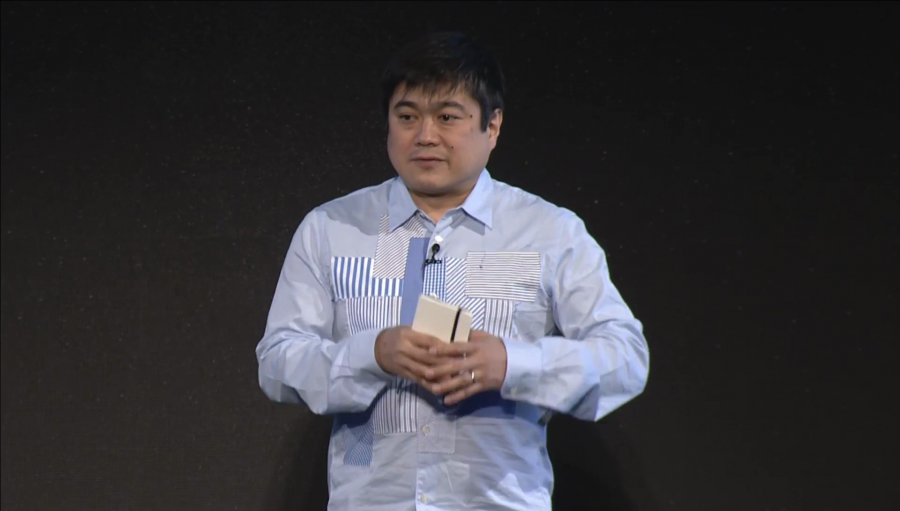I don’t know how many of you are old enough to remember The Blues Brothers, but there’s a scene in The Blues Brothers where they’re doing their sort of final gig and all these police officers are rolling in, and they say welcome to everybody, including members of the Illinois law enforcement community. So, I know that here we have probably some of the most disobedient people in the world, as well as members of the establishment and the law enforcement community. And so this is really kind of a treat, because I was talking to some of the people in administration, and I think MIT is one of the few places that we could have a conference about the topics that we’re going to talk about today, with sort of scholarship and a straight face. And so I think that this is sort of part of our mandate as MIT, to be doing this sort of thing.
The Media Lab has been trying to do these summer conferences. This is the second one. Last year we did one on design. And this year’s topic was interesting. Part of it got started— I remember I was having a conversation with a faculty member after they had gotten tenure. And I’d known him this faculty member for a while, and he said, “Well, you know there’s actually three research topics that I’d really really love to do.” He’s one of our best faculty. “But I can’t tell anybody, because I’m afraid. I’m afraid that it won’t get peer reviewed. I’m afraid I’ll be ridiculed. I’m afraid my students won’t come join my group anymore. So I just can’t tell anybody.”
And that got me thinking, because of those three topics were actually kind of important ideas. And so I realized that right now in science, because of the peer review process, because you sort of have to fit in, there is a lot of important research that needs to be done. So it’s not like the days like Copernicus, where scientists are killed for what they publish. But still, it’s sort of like dying when suddenly you’re left out to hang.
Having said that, talking to people who study the history of science, and you look at Nobel Prize winners, many of them have really taken sort of career-threatening risks in order to win Nobel Prizes. So even science, which feels like an area where you’re supposed to question authority and think for yourself, you actually have to be rather risk-taking and disobedient.
So this idea of forbidden research being an important area was kind of germinating. And then Ethan in Civic Media—he’ll talk more about it—did this conference called Freedom to Innovate on how certain laws impinge on our ability to innovate, and how laws meant for criminals are often applied towards legitimate research to stifle innovation. So there are a number of these sort of things coming together. And then I realized that there’s a kind of courage that needs to happen when we explore these areas of forbidden research.
So that was kind of how we got the idea for the conference. And I’ll have Ethan come up later and describe a little bit more about it. But one other thing I wanted to talk about was—and this will be sort of in the last panel—but how does an institution become disobedience-robust? So, when people question authority, how do you get stronger rather than weaker? Because I think laws and norms and rules are sort of set in place to usually protect the status quo. And it is really the mandate of academic institutions, or society in general, to question those laws and rules that are either outdated or wrong. Because if we didn’t have that question, if we didn’t have “disobedience,” we would still have slavery. We wouldn’t have had the civil rights movement.
And so if you think about people who are sort of enshrined today, like Martin Luther King, or Elizabeth Cady Stanton, or Harriet Tubman, or Mahatma Gandhi, or even the Boston Tea Party, they were quite disobedient, disruptive, and somewhat unlawful at the time. But without that, we wouldn’t have had a lot of positive social change. So we also want to talk about disobedience in the context of forbidden research.
And one thing I wanted to announce today— Unfortunately Reid Hoffman couldn’t be here this morning. He’ll be here tomorrow. But Reid Hoffman has agreed to fund a disobedience prize. And I was hoping that we could announced the winner today, but it turns out that we’ve had a number of conversations. It’s a lot more complicated than you might imagine. Because we reached out very broadly, from Malala to Anonymous. And you can imagine we have a diverse set of views on who should win the prize. The prize is a $250,000 cash prize. And so it’s going to be a process.
We’re first going to kind of open up and have a conversation around what are the principles of societally useful good disobedience. And then we’ll come up with a way to do the search. And then a group of people who will help us make the selection. So we don’t have a firm date when this prize will be given in exactly what form. But the fact that we’re going to do the prize is an experiment. And I think if the experiment goes well, we’ll continue to do it. But I think having a prize for good, solid, useful disobedience I think is a really important signal that we hope to be able to send.
So with that I’d like to bring up my cohost and the MC for today, Ethan Zuckerman.
Further Reference
Session liveblog by Willow Brugh et al.
